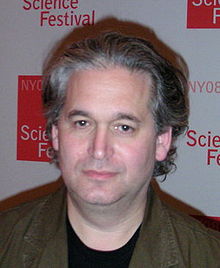
David Albert
Encyclopedia

Philosophy of physics
In philosophy, the philosophy of physics studies the fundamental philosophical questions underlying modern physics, the study of matter and energy and how they interact. The philosophy of physics begins by reflecting on the basic metaphysical and epistemological questions posed by physics:...
at Columbia University
Columbia University
Columbia University in the City of New York is a private, Ivy League university in Manhattan, New York City. Columbia is the oldest institution of higher learning in the state of New York, the fifth oldest in the United States, and one of the country's nine Colonial Colleges founded before the...
in New York. He received his B.S. in physics from Columbia College
Columbia College of Columbia University
Columbia College is the oldest undergraduate college at Columbia University, situated on the university's main campus in Morningside Heights in the borough of Manhattan in New York City. It was founded in 1754 by the Church of England as King's College, receiving a Royal Charter from King George II...
(1976) and his doctorate
Ph.D.
A Ph.D. is a Doctor of Philosophy, an academic degree.Ph.D. may also refer to:* Ph.D. , a 1980s British group*Piled Higher and Deeper, a web comic strip*PhD: Phantasy Degree, a Korean comic series* PhD Docbook renderer, an XML renderer...
in theoretical physics from The Rockefeller University (1981) under Professor Nicola Khuri. Afterwards he worked with Professor Yakir Aharonov
Yakir Aharonov
Yakir Aharonov is an Israeli physicist specializing in quantum physics. He is a Professor of Theoretical Physics and the James J. Farley Professor of Natural Philosophy at Chapman University in California. He is also a distinguished professor in Perimeter Institute.He also serves as a professor...
of Tel Aviv University
Tel Aviv University
Tel Aviv University is a public university located in Ramat Aviv, Tel Aviv, Israel. With nearly 30,000 students, TAU is Israel's largest university.-History:...
.
Prof. Albert has published two books (Quantum Mechanics and Experience (1992) and Time and Chance (2000) ) and numerous articles on quantum mechanics
Quantum mechanics
Quantum mechanics, also known as quantum physics or quantum theory, is a branch of physics providing a mathematical description of much of the dual particle-like and wave-like behavior and interactions of energy and matter. It departs from classical mechanics primarily at the atomic and subatomic...
. His books are both praised and criticized for their informal, conversational style, but he is routinely credited by both fan and critic as having a talent for communicating difficult, highly abstract concepts in ways that are accessible to the lay science reader.
Appearance in What the Bleep Do We Know!?
Prof. Albert appeared in the controversial movie What the Bleep Do We Know!?What the Bleep Do We Know!?
What the Bleep Do We Know!? is a 2004 film that combines documentary-style interviews, computer-animated graphics, and a narrative that describes the spiritual connection between quantum physics and consciousness...
(2004). He was disappointed with the final product, claiming that the film's producers used selective editing to make him appear to agree with claims that he completely disagreed with.
According to a Popular Science
Popular Science
Popular Science is an American monthly magazine founded in 1872 carrying articles for the general reader on science and technology subjects. Popular Science has won over 58 awards, including the ASME awards for its journalistic excellence in both 2003 and 2004...
article, he is "outraged at the final product." The article states that Albert granted the filmmakers a near-four hour interview about quantum mechanics being unrelated to consciousness or spirituality. His interview was then edited and incorporated into the film in a way that misrepresented his views. In the article, Albert also expresses his feelings of gullibility after having been "taken" by the filmmakers. Although Albert is listed as a scientist taking part in the sequel to What the Bleep, called "Down the Rabbit Hole" , this sequel is a "director's cut", composed of extra footage from the filming of the first movie. The "Down the Rabbit Hole" version features David as the first subject in the interview portion of the film. In that interview he expresses his disagreement with the major thrust of the original "What the Bleep Do We Know!?"
External links
- David Albert faculty page
- Review of What the Bleep Do We Know!? from Popular Science quoting Prof. Albert's opinion on his involvement with the film
- David Albert Interview at BigThink.com. Discussing the measurement problem in quantum mechanics theory (53 minutes).
- Video discussions with Sean CarrollSean CarrollSean Carroll may refer to:*Sean B. Carroll , US evolutionary biologist*Sean M. Carroll , US theoretical physicist*Seán Carroll , Irish Sinn Féin politician...
about science related topics on Bloggingheads.tvBloggingheads.tvBloggingheads.tv is a political, world events, philosophy, and science video blog discussion site in which the participants take part in an active back and forth conversation via webcam which is then broadcast online to viewers...

